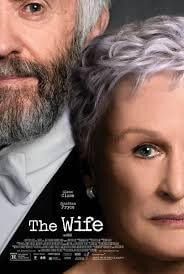In the background of all the painful and very necessary conversations about gender, power, and talent that have come out of the #MeToo movement, a figure has hovered. He’s frequently a drunk or a philanderer (or both), usually surrounded by sycophants who hang on his every word, and always intimidating and unquestioned in his knowledge and abilities. He is the Great Man Of Literature—or painting, or cinema, or any number of art forms—whose genius has been fetishized throughout the modern era. He is Norman Mailer, opining on the vigorous phallic symbolism of the sword on Mike Wallace’s show the morning after stabbing his wife Adele. He is Pablo Picasso, who reportedly once told one of his many mistresses that “women are machines for suffering.”
And in Swedish director Björn Runge’s new film, The Wife, he is Joe Castleman (Jonathan Pryce), a Brooklyn-born writer who, in the opening scene, gets the phone call he’s been waiting for: a flattering, Swedish-accented voice informing him that he’s the winner of that year’s Nobel Prize for literature. Listening in on the other line is Joe’s wife, Joan (Glenn Close), the living embodiment of the concept of emotional labor who’s devoted 35 years of her life to ensuring that Joe’s genius can flow unobstructed, untroubled by matters domestic or otherwise mundane. “I’ll take good care of him,” she reassures the faraway stranger. Of course, Joan has dreams and talents of her own—or she did, once.
The majority of The Wife takes place over the course of a few days, as Joe, Joan, and their adult son, David (Max Irons), travel to Stockholm for the Nobel awards ceremony. David, a frustrated writer himself, is sullen and resentful from the start. But Joan absorbs Joe’s joke to the Nobel welcoming committee about how “my wife doesn’t write” with the same stoicism with which she declines a condescending offer to go shopping with the rest of the silent appendages. It’s not until later that we learn that Joan used to write, and she was damn good at it—until she abandoned her dreams on the advice of bitter novelist Elaine Mozell (Elizabeth McGovern) and shacked up with her married writing teacher, Professor Castleman, instead.
Screenwriter Jane Anderson’s adaptation of Meg Wolitzer’s novel is skillfully executed and well paced, if conventional in its structure. Flashbacks to the Castlemans’ early years as a couple inform the main storyline, parceling out clues to the film’s central mystery: What’s driving the resentment behind Joan’s strained smile? The plot is further propelled by Nathaniel Bone (Christian Slater), a journalist who trails the Castlemans to Stockholm, where he invites Joan out for a round of afternoon drinks at a bar near their hotel. She politely accepts, yet another tedious obligation in a lifetime full of them. At the bar, Nathaniel confronts Joan with evidence of her husband’s many affairs, which she finds amusing; of course she already knows about that. But his next insinuation is more pointed: He’s read one of Joan’s early short stories, and thinks it’s curious how much better Joe’s writing became after he met her.
Close’s expression in that moment, the camera focused tightly on her face, is extraordinary: Decades worth of secrets and subtle slights shift like tectonic plates drifting apart, her eyes gleaming with the pain of their sudden movement. But even when she’s pushed to the side of the frame, it’s hard to take your eyes off of Close and her masterful, tightly controlled performance. Often, all Joan’s repression will allow the woman playing her is a pointed eyebrow raise or a seemingly involuntary purse of her lips, yet the character’s complex emotional state always comes through.
In comparison to Close’s, Pryce’s performance is relatively one-note; he plays Joe as a bumbling fool who’s lost without his wife to hand him his glasses and wipe the crumbs from his beard. That particular deconstruction—the public great man as private man-child—is quickly becoming a cliché, as much as the adoring, long-suffering wife or the college professor who seduces his students. Runge’s use of recurring visual symbols is similarly heavy-handed, adding little nuance or depth to the story’s more unoriginal elements. In fact, it’s Close’s wonderfully subtle characterization of Joan that lifts The Wife above its cliché setups and neat role reversals, which is really rather ironic. Once again, it’s the wife doing all the hard work. At least this time, she gets top billing.



































![Rob Reiner's son booked for murder amid homicide investigation [Updated]](https://img.pastemagazine.com/wp-content/avuploads/2025/12/15131025/MixCollage-15-Dec-2025-01-10-PM-9121.jpg)




